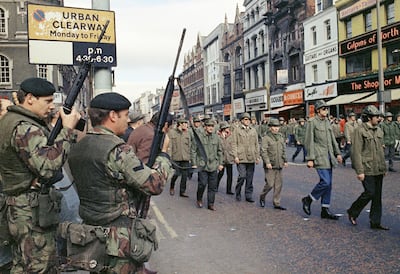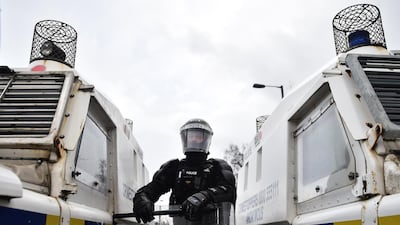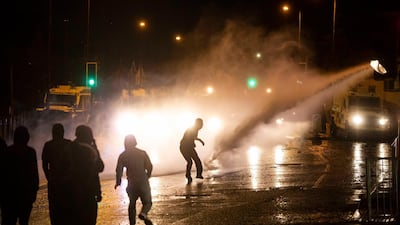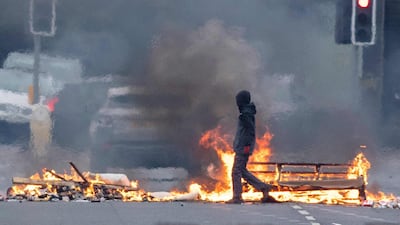You never forget your first bomb. On April 12, 1989, the solid whump of a 680-kilogram car bomb set off by the Irish Republican Army was enough to stop me and my classmates at St Peter’s Boys’ School dead in our tracks.
Our heads snapped right, watching the growing cloud of smoke rising from Charlotte Street, the site of our little town’s fortified police barracks. That blast – which I remember more as a feeling than a sound – killed Joanne Reilly, 20, who had been working in Heately & Morgan’s hardware shop beside the station belonging to the RUC, the local police force. It also injured nine police and 31 civilians.
Less than a kilometre from this rending confluence of history, politics and ordnance, just past the town square and out in Carlingford Lough, was – and is – the Border, which turns 100 next week.
Let’s give it a capital B - it deserves that much. Forests have been felled to print all the books written about how Ireland came to be partitioned on May 3, 1921 – six counties remaining in the UK as Northern Ireland, and the other 26 becoming an independent Irish Free State, and later, the Republic. You don’t need me to tell you that old story again.
For me, the Border – that snaking, 500km frontier that cuts across roads, bridges, fields, rivers, farms and even houses – was my country’s turbulent history made manifest. But it manifests in different ways. When I was young, the Border could be invisible. It started somewhere out there in the lough, although there is still some “jurisdictional ambiguity” as to exactly where. It ran up the Newry River just past Narrow Water, the scene of another IRA bombing in 1979, before taking a hard left and splitting a country road at the wee bridge on the bend before Cornamucklagh.
But there were enough little reminders that the Border was real. Sitting on the shore one afternoon as a teenager, I was surrounded by a unit of black-clad Royal Marines who piled on to the beach from the British patrol vessel lurking out in the lough. Despite Boris Johnson’s breezy, Brexit-related claim in 2018 that our Border was essentially just like the one between Camden and Islington, I doubt many Londoners are often face to face with combat troops.
Years later, I was lucky enough to be working as a local journalist on the Border as the changes wrought by the Good Friday Agreement came to pass. I was there in July 2000 when British army engineers removed their paint-splattered fortification from the centre of Crossmaglen in South Armagh – a region where the Border could be divined from a twisting line of bases and hilltop watchtowers, all bristling with surveillance technology.
The bombs and soldiers and shootings and hunger strikes and hooded bodies left in lonely ditches are largely gone now, and, until recently, the Border had been quietly disappearing into irrelevance as the Agreement – it, too, takes a capital letter – endured and common EU membership smoothed out the remaining differences.
When I was young, the Border could be invisible
But Brexit has done quite the job of reanimating our spectral Border, piling more political, economic and constitutional complexity on to a conflict the 1998 treaty had parked for another generation to figure out.
In Clare Dwyer Hogg’s 2018 short film Hard Border, Belfast-born actor Stephen Rea described how 1998 “and all the years in between” helped make the frontier disappear: “There but not there, a line of imagination that needed imagination to make it exist while unseen.”
Frontiers require imagination. You are standing on the same earth, but people have names and identities and states to partition it. This gives borders, especially disputed ones, the psychic strangeness of boundary places.
This left its impression on me, like a thumbprint in my mind. I’ve peeked through the rusty barriers pulled across the beach in Varosha that divides Turks from Greeks in Cyprus, and felt right at home. Jerusalem and Hebron were studies in razor-sharp, micro-managed partition – down to every house, plot of land and street corner.
I wish I could say that these outside experiences of partition had left me more phlegmatic about Ireland being divided. But, growing up where and how I did, the Border still instinctively strikes me as an aberration in the island home of my imagination. It took me a long time to appreciate that for my unionist neighbours, the anomaly in Ireland is the Republic that broke away from the mothership.
Will partition in Ireland come to an end? I don’t know. Perhaps, if enough of us want it to and the time is right, is my best answer. What will endure are the memories of 30-odd years of violence. Certainly, the ‘89 bombing has followed me down the years. On December 10, 2016, I was in Istanbul and the crump of a double explosion in nearby Besiktas made me jack-knife out of bed, my heart hammering much as it did 27 years before.
Even for those who didn't experience the Troubles directly, the violence has a long, malignant half-life. A 2017 study from Queen's University Belfast found that "the impact of the conflict remains and affects communities and generations".
And now, a new generation is getting its first taste of violence. Recent rioting by working-class loyalist youths in Belfast, Derry and elsewhere – fuelled by a mix of deprivation, Brexit-related anxiety, a controversial IRA funeral plus paramilitary manipulation – shows how combustible Northern Ireland still is.
The centenary of Ireland’s division will come and go. A BBC poll on April 21 found that just 40 per cent of people in Northern Ireland thought the state’s foundation worth celebrating. Unionist politicians will dutifully do their best to mark it, with some underwhelming input from a British government with bigger fish to fry. The centenary will be studiously ignored by Irish nationalists, many of whom still feel the “national question” remains unresolved.
So be it. What comes to my mind is the cries of the curlews flying over Carlingford Lough. They take wing against the backdrop of the Mournes and Cooleys – solemn mountains that will be there long after we, our maps and our borders fade from history, as if we were never there.
Declan McVeigh is a sub-editor at The National
The National's picks
4.35pm: Tilal Al Khalediah
5.10pm: Continous
5.45pm: Raging Torrent
6.20pm: West Acre
7pm: Flood Zone
7.40pm: Straight No Chaser
8.15pm: Romantic Warrior
8.50pm: Calandogan
9.30pm: Forever Young
Jetour T1 specs
Engine: 2-litre turbocharged
Power: 254hp
Torque: 390Nm
Price: From Dh126,000
Available: Now
UAE currency: the story behind the money in your pockets
Ponti
Sharlene Teo, Pan Macmillan
The specs
Engine: 2.0-litre 4cyl turbo
Power: 261hp at 5,500rpm
Torque: 405Nm at 1,750-3,500rpm
Transmission: 9-speed auto
Fuel consumption: 6.9L/100km
On sale: Now
Price: From Dh117,059
The specs
Engine: 4.0-litre flat-six
Torque: 450Nm at 6,100rpm
Transmission: 7-speed PDK auto or 6-speed manual
Fuel economy, combined: 13.8L/100km
On sale: Available to order now
OPTA'S PREDICTED TABLE
1. Liverpool 101 points
2. Manchester City 80
3. Leicester 67
4. Chelsea 63
5. Manchester United 61
6. Tottenham 58
7. Wolves 56
8. Arsenal 56
9. Sheffield United 55
10. Everton 50
11. Burnley 49
12. Crystal Palace 49
13. Newcastle 46
14. Southampton 44
15. West Ham 39
16. Brighton 37
17. Watford 36
18. Bournemouth 36
19. Aston Villa 32
20. Norwich City 29
COMPANY%20PROFILE
%3Cp%3EFounder%3A%20Hani%20Abu%20Ghazaleh%3Cbr%3EBased%3A%20Abu%20Dhabi%2C%20with%20an%20office%20in%20Montreal%3Cbr%3EFounded%3A%202018%3Cbr%3ESector%3A%20Virtual%20Reality%3Cbr%3EInvestment%20raised%3A%20%241.2%20million%2C%20and%20nearing%20close%20of%20%245%20million%20new%20funding%20round%3Cbr%3ENumber%20of%20employees%3A%2012%3C%2Fp%3E%0A
Conflict, drought, famine
Estimates of the number of deaths caused by the famine range from 400,000 to 1 million, according to a document prepared for the UK House of Lords in 2024.
It has been claimed that the policies of the Ethiopian government, which took control after deposing Emperor Haile Selassie in a military-led revolution in 1974, contributed to the scale of the famine.
Dr Miriam Bradley, senior lecturer in humanitarian studies at the University of Manchester, has argued that, by the early 1980s, “several government policies combined to cause, rather than prevent, a famine which lasted from 1983 to 1985. Mengistu’s government imposed Stalinist-model agricultural policies involving forced collectivisation and villagisation [relocation of communities into planned villages].
The West became aware of the catastrophe through a series of BBC News reports by journalist Michael Buerk in October 1984 describing a “biblical famine” and containing graphic images of thousands of people, including children, facing starvation.
Band Aid
Bob Geldof, singer with the Irish rock group The Boomtown Rats, formed Band Aid in response to the horrific images shown in the news broadcasts.
With Midge Ure of the band Ultravox, he wrote the hit charity single Do They Know it’s Christmas in December 1984, featuring a string of high-profile musicians.
Following the single’s success, the idea to stage a rock concert evolved.
Live Aid was a series of simultaneous concerts that took place at Wembley Stadium in London, John F Kennedy Stadium in Philadelphia, the US, and at various other venues across the world.
The combined event was broadcast to an estimated worldwide audience of 1.5 billion.
THE SPECS
Engine: Four-cylinder 2.5-litre
Transmission: Seven-speed auto
Power: 165hp
Torque: 241Nm
Price: Dh99,900 to Dh134,000
On sale: now
The alternatives
• Founded in 2014, Telr is a payment aggregator and gateway with an office in Silicon Oasis. It’s e-commerce entry plan costs Dh349 monthly (plus VAT). QR codes direct customers to an online payment page and merchants can generate payments through messaging apps.
• Business Bay’s Pallapay claims 40,000-plus active merchants who can invoice customers and receive payment by card. Fees range from 1.99 per cent plus Dh1 per transaction depending on payment method and location, such as online or via UAE mobile.
• Tap started in May 2013 in Kuwait, allowing Middle East businesses to bill, accept, receive and make payments online “easier, faster and smoother” via goSell and goCollect. It supports more than 10,000 merchants. Monthly fees range from US$65-100, plus card charges of 2.75-3.75 per cent and Dh1.2 per sale.
• 2checkout’s “all-in-one payment gateway and merchant account” accepts payments in 200-plus markets for 2.4-3.9 per cent, plus a Dh1.2-Dh1.8 currency conversion charge. The US provider processes online shop and mobile transactions and has 17,000-plus active digital commerce users.
• PayPal is probably the best-known online goods payment method - usually used for eBay purchases - but can be used to receive funds, providing everyone’s signed up. Costs from 2.9 per cent plus Dh1.2 per transaction.
Our House, Louise Candlish,
Simon & Schuster
Key facilities
- Olympic-size swimming pool with a split bulkhead for multi-use configurations, including water polo and 50m/25m training lanes
- Premier League-standard football pitch
- 400m Olympic running track
- NBA-spec basketball court with auditorium
- 600-seat auditorium
- Spaces for historical and cultural exploration
- An elevated football field that doubles as a helipad
- Specialist robotics and science laboratories
- AR and VR-enabled learning centres
- Disruption Lab and Research Centre for developing entrepreneurial skills
The specs
Engine: 2.0-litre 4-cyl turbo
Power: 201hp at 5,200rpm
Torque: 320Nm at 1,750-4,000rpm
Transmission: 6-speed auto
Fuel consumption: 8.7L/100km
Price: Dh133,900
On sale: now
Killing of Qassem Suleimani
Specs
Engine: Dual-motor all-wheel-drive electric
Range: Up to 610km
Power: 905hp
Torque: 985Nm
Price: From Dh439,000
Available: Now
A little about CVRL
Founded in 1985 by Sheikh Mohammed bin Rashid, Vice President and Ruler of Dubai, the Central Veterinary Research Laboratory (CVRL) is a government diagnostic centre that provides testing and research facilities to the UAE and neighbouring countries.
One of its main goals is to provide permanent treatment solutions for veterinary related diseases.
The taxidermy centre was established 12 years ago and is headed by Dr Ulrich Wernery.
TO A LAND UNKNOWN
Director: Mahdi Fleifel
Starring: Mahmoud Bakri, Aram Sabbah, Mohammad Alsurafa
Rating: 4.5/5
Key products and UAE prices
iPhone XS
With a 5.8-inch screen, it will be an advance version of the iPhone X. It will be dual sim and comes with better battery life, a faster processor and better camera. A new gold colour will be available.
Price: Dh4,229
iPhone XS Max
It is expected to be a grander version of the iPhone X with a 6.5-inch screen; an inch bigger than the screen of the iPhone 8 Plus.
Price: Dh4,649
iPhone XR
A low-cost version of the iPhone X with a 6.1-inch screen, it is expected to attract mass attention. According to industry experts, it is likely to have aluminium edges instead of stainless steel.
Price: Dh3,179
Apple Watch Series 4
More comprehensive health device with edge-to-edge displays that are more than 30 per cent bigger than displays on current models.
The smuggler
Eldarir had arrived at JFK in January 2020 with three suitcases, containing goods he valued at $300, when he was directed to a search area.
Officers found 41 gold artefacts among the bags, including amulets from a funerary set which prepared the deceased for the afterlife.
Also found was a cartouche of a Ptolemaic king on a relief that was originally part of a royal building or temple.
The largest single group of items found in Eldarir’s cases were 400 shabtis, or figurines.
Khouli conviction
Khouli smuggled items into the US by making false declarations to customs about the country of origin and value of the items.
According to Immigration and Customs Enforcement, he provided “false provenances which stated that [two] Egyptian antiquities were part of a collection assembled by Khouli's father in Israel in the 1960s” when in fact “Khouli acquired the Egyptian antiquities from other dealers”.
He was sentenced to one year of probation, six months of home confinement and 200 hours of community service in 2012 after admitting buying and smuggling Egyptian antiquities, including coffins, funerary boats and limestone figures.
For sale
A number of other items said to come from the collection of Ezeldeen Taha Eldarir are currently or recently for sale.
Their provenance is described in near identical terms as the British Museum shabti: bought from Salahaddin Sirmali, "authenticated and appraised" by Hossen Rashed, then imported to the US in 1948.
- An Egyptian Mummy mask dating from 700BC-30BC, is on offer for £11,807 ($15,275) online by a seller in Mexico
- A coffin lid dating back to 664BC-332BC was offered for sale by a Colorado-based art dealer, with a starting price of $65,000
- A shabti that was on sale through a Chicago-based coin dealer, dating from 1567BC-1085BC, is up for $1,950
Red flags
- Promises of high, fixed or 'guaranteed' returns.
- Unregulated structured products or complex investments often used to bypass traditional safeguards.
- Lack of clear information, vague language, no access to audited financials.
- Overseas companies targeting investors in other jurisdictions - this can make legal recovery difficult.
- Hard-selling tactics - creating urgency, offering 'exclusive' deals.
Courtesy: Carol Glynn, founder of Conscious Finance Coaching
A Bad Moms Christmas
Dir: John Lucas and Scott Moore
Starring: Mila Kunis, Kathryn Hahn, Kristen Bell, Susan Sarandon, Christine Baranski, Cheryl Hines
Two stars
Volvo ES90 Specs
Engine: Electric single motor (96kW), twin motor (106kW) and twin motor performance (106kW)
Power: 333hp, 449hp, 680hp
Torque: 480Nm, 670Nm, 870Nm
On sale: Later in 2025 or early 2026, depending on region
Price: Exact regional pricing TBA
What sanctions would be reimposed?
Under ‘snapback’, measures imposed on Iran by the UN Security Council in six resolutions would be restored, including:
- An arms embargo
- A ban on uranium enrichment and reprocessing
- A ban on launches and other activities with ballistic missiles capable of delivering nuclear weapons, as well as ballistic missile technology transfer and technical assistance
- A targeted global asset freeze and travel ban on Iranian individuals and entities
- Authorisation for countries to inspect Iran Air Cargo and Islamic Republic of Iran Shipping Lines cargoes for banned goods
Specs
Engine: Duel electric motors
Power: 659hp
Torque: 1075Nm
On sale: Available for pre-order now
Price: On request
Pharaoh's curse
British aristocrat Lord Carnarvon, who funded the expedition to find the Tutankhamun tomb, died in a Cairo hotel four months after the crypt was opened.
He had been in poor health for many years after a car crash, and a mosquito bite made worse by a shaving cut led to blood poisoning and pneumonia.
Reports at the time said Lord Carnarvon suffered from “pain as the inflammation affected the nasal passages and eyes”.
Decades later, scientists contended he had died of aspergillosis after inhaling spores of the fungus aspergillus in the tomb, which can lie dormant for months. The fact several others who entered were also found dead withiin a short time led to the myth of the curse.
Veil (Object Lessons)
Rafia Zakaria
Bloomsbury Academic
EPL's youngest
- Ethan Nwaneri (Arsenal)
15 years, 181 days old
- Max Dowman (Arsenal)
15 years, 235 days old
- Jeremy Monga (Leicester)
15 years, 271 days old
- Harvey Elliott (Fulham)
16 years, 30 days old
- Matthew Briggs (Fulham)
16 years, 68 days old
Killing of Qassem Suleimani
THE SPECS
Engine: 4.0L twin-turbo V8
Gearbox: eight-speed automatic
Power: 571hp at 6,000rpm
Torque: 800Nm from 2,000-4,500rpm
Fuel economy, combined: 11.4L/100km
Price, base: from Dh571,000
On sale: this week
Cricket World Cup League 2
UAE results
Lost to Oman by eight runs
Beat Namibia by three wickets
Lost to Oman by 12 runs
Beat Namibia by 43 runs
UAE fixtures
Free admission. All fixtures broadcast live on icc.tv
Tuesday March 15, v PNG at Sharjah Cricket Stadium
Friday March 18, v Nepal at Dubai International Stadium
Saturday March 19, v PNG at Dubai International Stadium
Monday March 21, v Nepal at Dubai International Stadium
Sly%20Cooper%20and%20the%20Thievius%20Raccoonus
%3Cp%3E%3Cstrong%3EDeveloper%3A%3C%2Fstrong%3E%20Sucker%20Punch%20Productions%3Cbr%3E%3Cstrong%3EPublisher%3A%3C%2Fstrong%3E%20Sony%20Computer%20Entertainment%3Cbr%3E%3Cstrong%3EConsole%3A%3C%2Fstrong%3E%20PlayStation%202%20to%205%3Cbr%3E%3Cstrong%3ERating%3A%3C%2Fstrong%3E%205%2F5%3C%2Fp%3E%0A
%20Ramez%20Gab%20Min%20El%20Akher
%3Cp%3E%3Cstrong%3ECreator%3A%3C%2Fstrong%3E%20Ramez%20Galal%3C%2Fp%3E%0A%3Cp%3E%3Cstrong%3EStarring%3A%3C%2Fstrong%3E%20Ramez%20Galal%3C%2Fp%3E%0A%3Cp%3E%3Cstrong%3EStreaming%20on%3A%20%3C%2Fstrong%3EMBC%20Shahid%3C%2Fp%3E%0A%3Cp%3E%3Cstrong%3ERating%3A%20%3C%2Fstrong%3E2.5%2F5%3C%2Fp%3E%0A
THE CLOWN OF GAZA
Director: Abdulrahman Sabbah
Starring: Alaa Meqdad
Rating: 4/5
The more serious side of specialty coffee
While the taste of beans and freshness of roast is paramount to the specialty coffee scene, so is sustainability and workers’ rights.
The bulk of genuine specialty coffee companies aim to improve on these elements in every stage of production via direct relationships with farmers. For instance, Mokha 1450 on Al Wasl Road strives to work predominantly with women-owned and -operated coffee organisations, including female farmers in the Sabree mountains of Yemen.
Because, as the boutique’s owner, Garfield Kerr, points out: “women represent over 90 per cent of the coffee value chain, but are woefully underrepresented in less than 10 per cent of ownership and management throughout the global coffee industry.”
One of the UAE’s largest suppliers of green (meaning not-yet-roasted) beans, Raw Coffee, is a founding member of the Partnership of Gender Equity, which aims to empower female coffee farmers and harvesters.
Also, globally, many companies have found the perfect way to recycle old coffee grounds: they create the perfect fertile soil in which to grow mushrooms.
Specs
Engine: 51.5kW electric motor
Range: 400km
Power: 134bhp
Torque: 175Nm
Price: From Dh98,800
Available: Now
The specs
AT4 Ultimate, as tested
Engine: 6.2-litre V8
Power: 420hp
Torque: 623Nm
Transmission: 10-speed automatic
Price: From Dh330,800 (Elevation: Dh236,400; AT4: Dh286,800; Denali: Dh345,800)
On sale: Now











